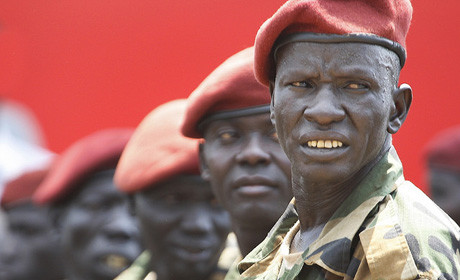
Vice has devoted its latest magazine issue solely to the civil war in South Sudan, launched as a multimedia project alongside an online documentary.
Saving South Sudan – which encompasses a series of written pieces and three-part documentary – was produced by just two people: journalist Robert Young Pelton and photojournalist Tim Freccia.
"It's a very complex and very heady situation, that's why we devoted an issue to it," Rocco Castoro, Vice Media editor-in-chief, told Journalism.co.uk.It's a very complex and very heady situation, that's why we devoted an issue to itRocco Castoro, Vice
This is not the first time Vice magazine has dedicated an issue to a single topic. In November 2012 the outlet published The Syria Issue, featuring content mostly written by Syrians.
However, this is the first time the media outlet has produced an issue featuring content from just two journalists.
The article and documentary "really are companion pieces," Castoro added. "I think if you just watch the documentary you're only getting half [the story].
"The documentary will fill you in to the point where, if you read the issue, you get a comprehensive top-to-bottom understanding of why this war is happening".
Saving South Sudan follows Pelton and Freccia as they travel to the country in search of its former vice president and current rebel leader, Riek Machar.
Over the course of their four-week visit in February, the pair managed to not only find, but interview, Machar, who President Salva Kiir had accused of attempting a government coup in December 2013. As widely reported, this claim was rejected by Machar.
However, the project was not without its challenges. Pelton and Freccia initially struggled to find a pilot willing to fly them into South Sudan's rebel territory, and Pelton says they were assaulted "numerous times" by locals desperate for money and food.
Electricity – necessary for internet and satellite communications with the Vice office back in New York – was also in short supply.
Speaking to Journalism.co.uk by email, Freccia explained that he and Pelton were sometimes forced to resort to 'MacGyver-ish' solutions to top-up batteries.
"This entails finding a generator (or truck motor), convincing (the current) owner to let us use it, then purchasing fuel to run it – at 'war prices'," he said.
When the pair returned from South Sudan, Pelton wrote the majority of the magazine content – around 40,000 words – in just two weeks.
Pelton used an iPhone to take notes and an iPad for GPS software, while Freccia shot video and photos on a Canon 5D Mark III, his preferred camera for a number of reasons.
"They have full frame sensors, produce excellent video images, are a solid stills platform – I've shot stills and motion pictures together, throughout my entire career," he said.
"The lenses are sharp, they're built for the environments I work in, and they are affordable enough to lose to weather, dirt, destruction and/or theft."
Another essential bit of kit was a satellite phone and modem, which allowed Freccia to send video and images over satellite.
In familiar Vice fashion, the documentary contrasts relaxed 'behind-the-scenes' footage – such as Pelton trying his hand at hunting, and failing miserably – with more traditional news footage, such as scenes of famine and violent looting.
These scenes were deliberately included to give the documentary a solid sense of reality, as Pelton explains.
"I deliberately want people to see the normal parts of a region and then get increasingly disturbed as they sense that something is going terribly wrong," he told Journalism.co.uk by email.
"This is the key to understanding war. Not to see beheadings, raped women or burnt bodies but to see how war suddenly envelopes normal life, plunging people into terror and chaos.
"I never want to shock or repulse, I only want people to care and engage."I never want to shock or repulse, I only want people to care and engageRobert Young Pelton, journalist
There has been criticism that the civil war in South Sudan has received relatively little media coverage compared to the conflicts in Syria and Ukraine, for example. Freccia puts this down to "Africa fatigue" in general.
"The world put a lot of energy into celebrating the birth of the 'newest nation'," he said (South Sudan was named as independent in July 2011).
"I think people just don't want to know that it isn't all ponies and ice cream."
He added that it was difficult to get Western audiences to pay attention to Africa, due to the nature of the region's long-standing and often complex conflicts.
However, he said he believed Vice's "predominantly youth market have a much better idea of what's going on."
"Robert did a fantastic job of boiling South Sudan down into a digestible story, while not dumbing it down," he added.
For Pelton's part, he hopes that Saving South Sudan will help the world to see those living in the country as "normal people, thinking, living and surviving with similar goals, aspirations and hopes".Vice's predominantly youth market have a much better idea of what's going onTim Freccia, photojournalist
"I dislike 'awareness' campaigns and empty gestures," Pelton said. "I want people to pick a passion and follow it.
"Imagine [taking] a hashtag selfie next to a car crash and doing nothing."

Cover image of Saving South Sudan, shot by Tim Frecccia
Free daily newsletter
If you like our news and feature articles, you can sign up to receive our free daily (Mon-Fri) email newsletter (mobile friendly).
Related articles
- Futureproofing your newsroom: understand your USP in a crowded space
- Earn while you learn: VICE pays US journalism students for pitching mental health stories
- Report: The strengths and weaknesses of 7 digital news outlets as they tackle international expansions
- 'We're all in this together': Tips from Vice for women starting out in journalism
- Why digital-born publishers are key to the coverage of climate change











